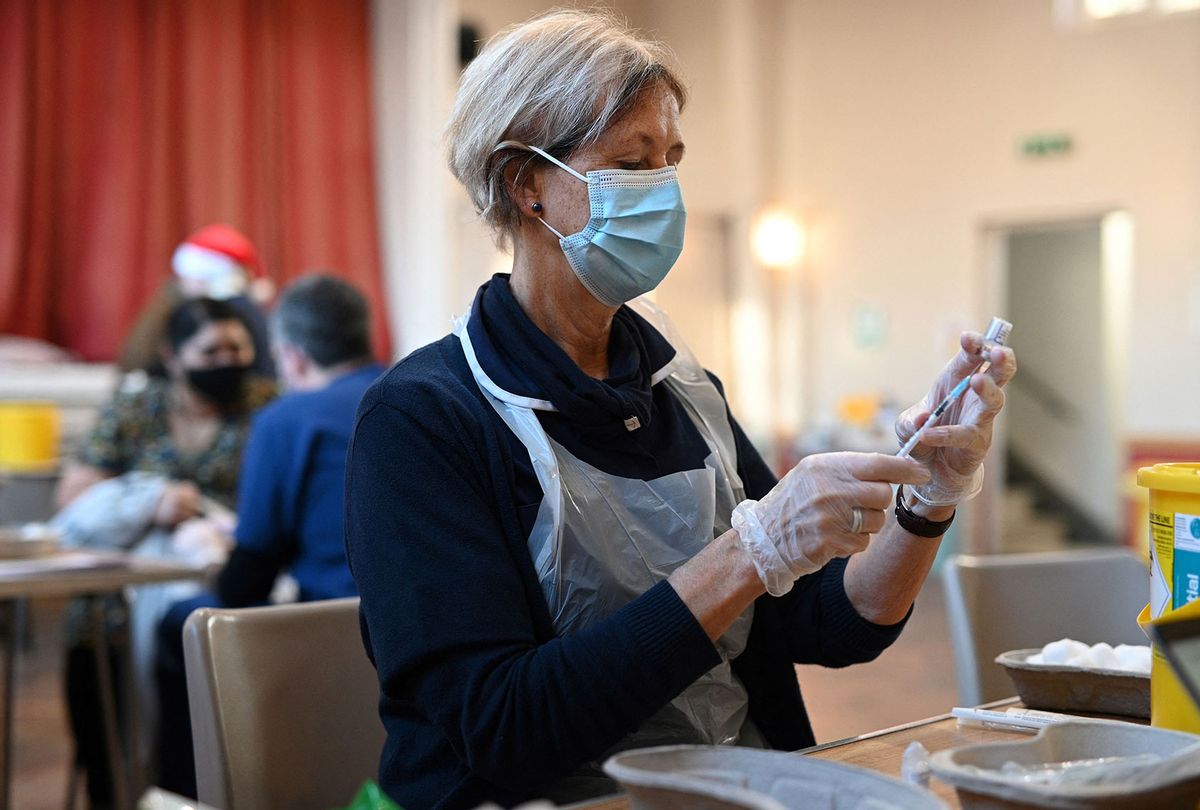Since the omicron variant was first discovered in the United States last month, many scientists have been fearful that the variants' many unique mutations compared to its peer variants (including delta) might make omicron more adept at evading existing vaccines. A new study validates those worries, but also provides a splash of hope for those who have received their booster shots.
In the article in question, researchers from the Imperial College London COVID-19 response team found that vaccine effectiveness against omicron is between zero and 20 percent for those who have been fully vaccinated with two doses of vaccine. That effectiveness range, zero to 20 percent, may sound dismal. But for those who also received a booster shot, the findings for vaccine effectiveness against omicron were much, much rosier.
Specifically, those who had received three shots — meaning the two-dose vaccination plus a booster shot — saw a vaccine effectiveness of between 55 percent and 80 percent against the omicron variant.
The vast gulf between the two ranges suggests that a booster shot is crucial to protection against the omicron variant. The findings also reinforce the public statements of some public health experts, including former FDA commissioner Dr. Scott Gottlieb, who have stated that they believe the COVID-19 vaccine should be a three-dose, not a two-dose shot.
Certainly, three-dose vaccines are not unusual; Cuba's COVID-19 vaccine, which has 92.4% efficacy, and the HPV vaccine, are both three-dose vaccines.
Additionally, the Imperial College London COVID-19 response team had other intriguing findings regarding the omicron strain's potential to reinfect. Indeed, their study suggests that people who were infected by the omicron strain are 5.4 times more likely to get reinfected than people who were infected by the delta strain. Hence, scientists say that past omicron infection provides little protection from reinfection. Notably, the study did not indicate that omicron could cause more severe illness than delta.
Likewise, patients who were infected with omicron two or more weeks after their second vaccine dose were much more likely to develop symptomatic infections than those who were infected with delta during a similar timeframe. The same was true for individuals taking the AstraZeneca and Pfizer vaccines who were two or more weeks past their booster shots.
The study has not yet been peer reviewed, but was presented in the latest report from the World Health Organization's Collaborating Centre for Infectious Disease Modelling.
Want more health and science stories in your inbox? Subscribe to Salon's weekly newsletter The Vulgar Scientist.
The omicron variant has given a third wind to the COVID-19 pandemic, prompting President Biden to announce last week that he is giving away half a billion at-home coronavirus tests, while warning the unvaccinated that they are playing with "life or death" for both themselves and the people around them.
Although omicron is more transmissible and vaccine evasive than previous COVID-19 strains, even being partially vaccinated significantly reduces a patient's chances of developing a severe infection. Indeed, as this study seems to affirm, being fully vaccinated and boosted almost guarantees that, even if a patient develops a symptomatic infection, it will not be so severe that they will need to be hospitalized.
Experts fear that one of the biggest threats from omicron is that it will send so many people to the hospital — particularly the unvaccinated or inadequately vaccinated — that medical systems will be overwhelmed. According to U.S. infectious disease expert Dr. Anthony Fauci, the last weekly average for COVID-19 cases was 150,000, a trend of increase mainly fueled by omicron overtaking the once-dominant delta strain. While there are early signs that this worst case scenario may not happen, Fauci warned against complacency.
"If you have many, many, many more people with a less level of severity, that might kind of neutralize the positive effect of having less severity when you have so many more people," Fauci told reporters. "And we're particularly worried about those who are in that unvaccinated class. Those are the most vulnerable ones when you have a virus that is extraordinarily effective in getting to people and infecting them the way omicron is."
What we know about omicron:

Shares